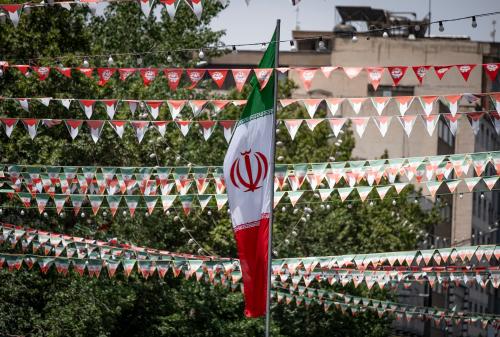Daalder and O’Hanlon are authors of Winning Ugly: NATO’s War to Save Kosovo (Brookings, 2000).
Gov. George W. Bush and former Defense Secretary Richard Cheney have become increasingly strident in their claim that the Clinton-Gore administration has overcommitted and underinvested in the U.S. military. While pledging to devote additional resources to defense, the Republican team has also promised to review U.S. overseas commitments “in dozens of countries.”
This argument rests on two assertions—that under the current administration the U.S. military has been sent on too many missions for too long and that a Bush administration would substantially cut our military presence overseas. The first assertion is simply not true. The second, if true, would damage American interests.
First, the question of past U.S. deployments.
Mr. Bush and Mr. Cheney are simply wrong to claim that these deployments are up 300 percent over the last decade. At the end of the Cold War, when President George Bush was in office and Mr. Cheney was defense secretary, about 500,000 U.S. military personnel were routinely overseas at any time. Today, that number is down 50 percent, to about 250,000.
Of course, not all overseas presence is equally taxing on our men and women in uniform. For example, troops in Germany are there for extended periods with their families and most of the comforts of home. And those troops have been cut back drastically since the Cold War ended in 1991. Meanwhile, difficult operations in which forces deploy abroad, away from home and without their families, have indeed increased—but by perhaps 15 percent, not 300 percent.
Far from having sent American forces around the world on undefined missions for overextended periods as Mr. Bush and Mr. Cheney claim, the administration has been highly discriminating.
Other than Somalia, Clinton-Gore have threatened and used force only in areas of real strategic concern: in the Persian Gulf against Iraq, in Europe against Serbia and its Bosnian allies, in Asia to deter Chinese threats against Taiwan, and in the Caribbean against a dictatorial regime in Haiti.
Despite considerable provocation, the United States did not intervene in Rwanda, Sierra Leone, Congo or East Timor, even though a case for intervention could be made, especially for Rwanda. Indeed, rather than being the world’s 911, the administration has supported regional powers like Nigeria in Africa and Australia in Asia to spearhead interventions intended to protect human and minority rights.
Today, the United States deploys armed forces away from home base in six key areas. There are Army troops in Korea and the Balkans, Marines in Okinawa, Navy forces in the Western Pacific and the Mediterranean and air, sea, and land forces in the Persian Gulf. In each of these places, anywhere from 10,000 to 40,000 U.S. personnel maintain continuous or nearly continuous presence and deterrence operations.
Far from reflecting the proclivities of an undisciplined Clinton-Gore administration for overusing military power on unimportant missions, each of these deployments serves core U.S. interests in important parts of the world. The U.S. has deployed forces in Korea, Japan, and key waterways for decades. The commitment to the Persian Gulf started in 1980 and was broadened after the 1991 gulf war to contain Saddam Hussein, a policy that continues to receive bipartisan support today.
Only in the Balkans were substantial U.S. military commitments begun by the Clinton-Gore administration. The United States and its NATO allies conducted limited air strikes in Bosnia in 1995, waged a substantial air war against Serbia in 1999 and now deploy limited forces as part of NATO peace operations in both Bosnia and Kosovo.
The U.S. military presence in the Balkans is hardly a peripheral interest. Our limited presence is the natural outgrowth of the U.S. leadership role in NATO. Nor is the commitment disproportionately large. Our European allies contribute well over three-quarters of the military manpower in both NATO operations and pay more than 90 percent of the bill to help sustain peace in the region. That is as it should be, but so is a limited American contribution to an area of vital strategic concern.
So far from overextending the American military, U.S. overseas deployments have served important U.S. interests. If Mr. Bush and Mr. Cheney want to scale back American military deployments abroad, they have a harder job than they seem to realize. At a minimum, they owe it to the voters to start explaining where and how they would cut.
The Brookings Institution is committed to quality, independence, and impact.
We are supported by a diverse array of funders. In line with our values and policies, each Brookings publication represents the sole views of its author(s).



Commentary
Op-edWhere to Cut U.S. Military Presence?
September 11, 2000